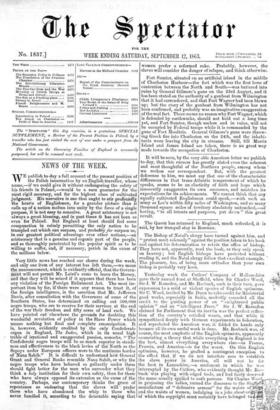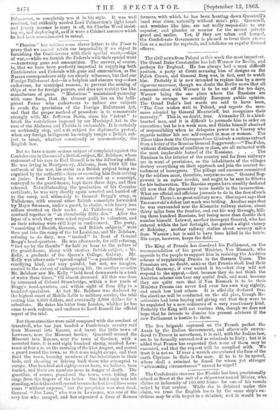Yesterday week the Cutlers' Company of Hullamshire gave their annual
feast at Sheffield, when Sir Charles Wood, Sir J. W. Ramsden, and Mr. Roebuck, each in their turn, gave expression to a mild or violent species of English optimism. Sir C. Wood, invited by Mr. Dunn to take credit for Ministerial good works, especially in India, modestly conceded all the credit to the guiding power of an "enlightened public opinion" and an "intelligent Press." Sir J. W. liamsden claimed for Parliament that its inertia was the perfect reflec- tion of the country's satisfied wants, and that while it sympathized deeply with German experiments in federation, and reprobated the American war, it folded its hands only because all its own useful work is done. Mr. Roebuck was, of course, the most emphatic of the English optimists, apparently enunciating a theory that while everything in Englund is for the best, almost everything everywhere else—in France, Prussia, and America—is for the worst. On this English optimism, however, he grafted a contingent exception to the effect that if we do not interfere soon to establish the slave power in America, all will not be for the best in Lancashire,—a sentiment in which he was interrupted by g, the Cutlers who evidently thought Mr. Roe- buck was playin with edged tools, and had fairly deserved the name usually applied to such persons. Sir Charles Wood in proposing the ladies, turned the discourse to the Sh manufacture of "defensive armour" for the waists o end the waists of women, indulging in a joke about c of which the copyright must certainly have belonged to, Palmerston, so completely was it in his style. It was well received, but evidently needed Lord Palmerston's light touch and jaunty manner to carry it off, Sir Charles Wood insist- ing on, and deploying it, as if it were a Cabinet measure which he had been commissioned to reveal.



































 Previous page
Previous page